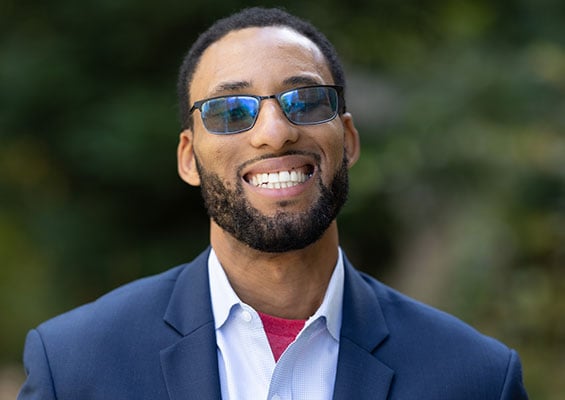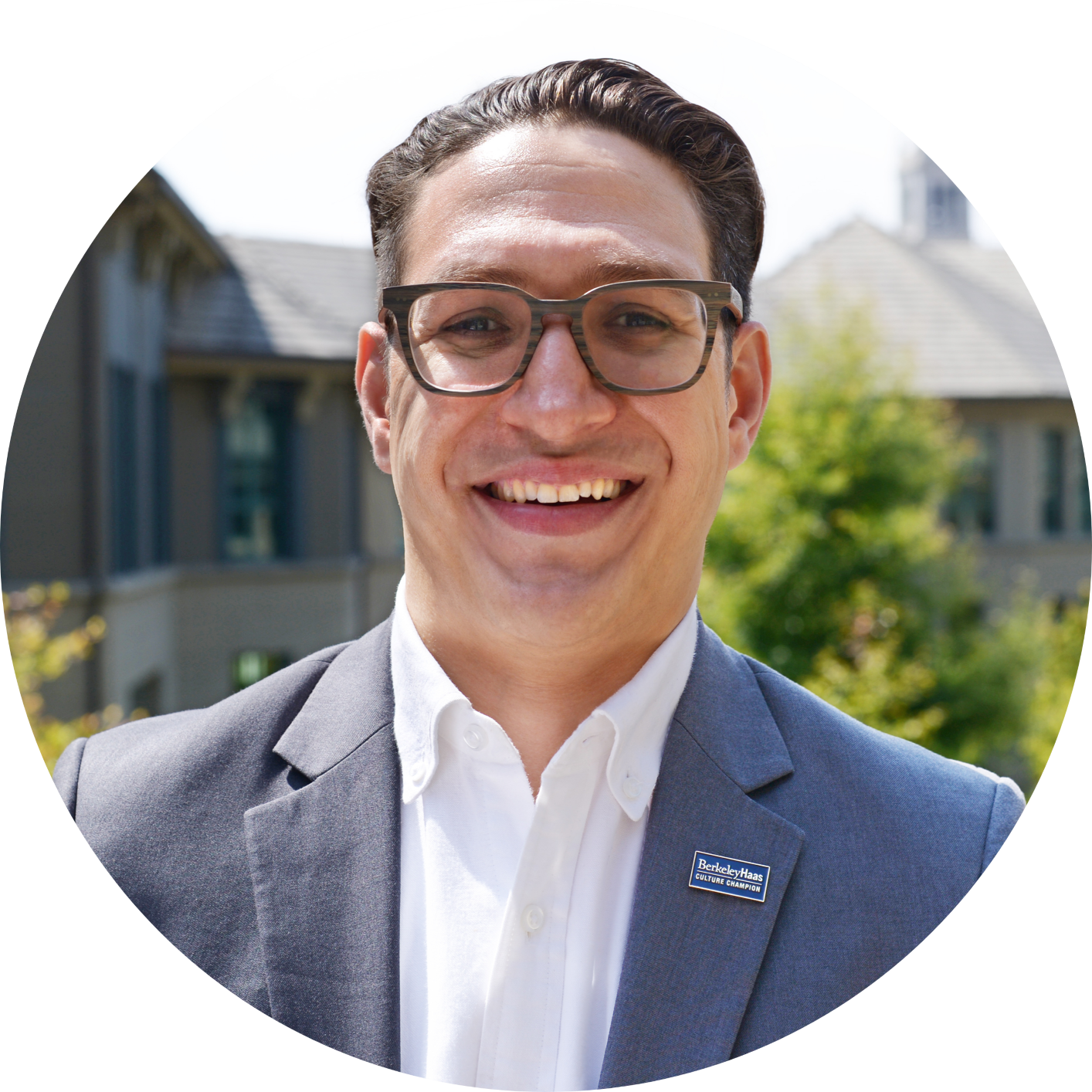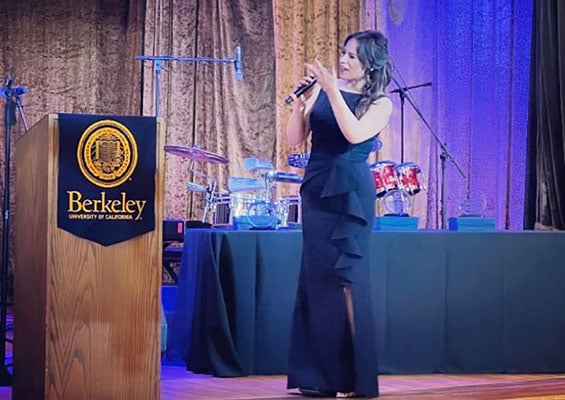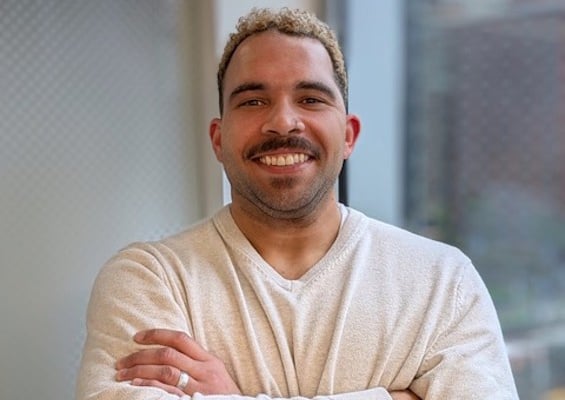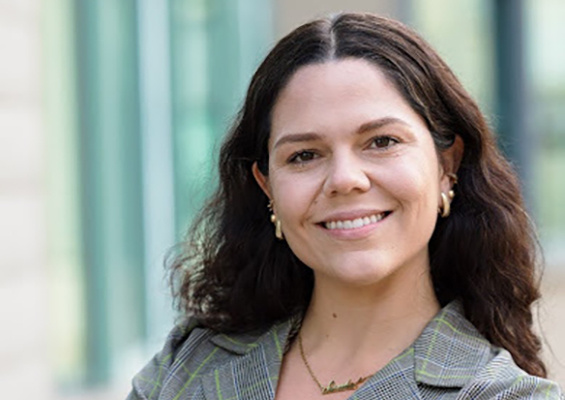After taking what he calls the “typical engineer’s approach” to researching and applying to business school—“I created a giant spreadsheet to track dozens of factors, from rankings to location to job placement statistics”—Alex Berry, MBA 24, knows now that the “insights you get from spreadsheets and those your get from the heart provide different types of guidance.”
For example, Alex noted the tendency to ask MBA applicants the question, “What is your North Star?” According to Alex, that is just too big a question. “You’re better off breaking it down: Why business school and not some other graduate degree? Why now? Why this particular school? It really is all about understanding what problem—in your life, or career, or society—that you can’t solve without getting an MBA,” he said.
The deeper he got into the application process, the more Alex found his attention shifting to the “who” at Berkeley Haas: professors, admissions officers, alumni, and student leaders. Their voices filled in hidden gaps in his spreadsheets.
Among those voices were Haas students and graduates who are members of the Consortium for Graduate Study in Management. They were a huge source of support in his application process and remain a “family” for Alex. He recalls a Consortium grad who connected him with another Haas alum who spent time on the phone with him days before the decision deadline for the Berkeley Haas full-time MBA program. It wasn’t until much later that Alex found out the person he was speaking with was on the East Coast, so what was a comfortable eight in the evening conversation for Alex, lasted from 11 to midnight on the other end. With Consortium Fellows Monica Shavers, MBA 23, and Alex Hunter, MBA 23, Alex talked about what it means to be and live as a Haas MBA. “They helped me realize this is a place where I could self-actualize into the cool, Black nerdy, compassionate leader I always wanted to be. That was huge!”
Alex came to understand that the career problem he wanted to solve was how to braid his technology background, his leadership skills, and his social entrepreneur focus into a single, strong career thread that would allow him to have a positive, tangible impact on people and communities. “As much as I enjoyed my program manager role at Intel, I realized that my work didn’t directly touch people’s lives,” he said. “Coming from a position of corporate privilege, I wanted to engage with others so they could reach further in their own careers.” That desire led him to create CMD (Chocolate Milk Diplomacy, named for Alex’s favorite beverage), designed to help people in underserved, underrepresented, and untapped communities get equitable access to career development.
But after a few years of being “a Big Tech guy during the day and a social entrepreneur at night,” Alex realized that as much as he loves Big Tech and big organizations, it might not be the “sweet spot” for him long-term. “My career hypothesis is more of a side-step than a pivot. I’m curious to see how I can take my career in a different direction, like a Series C start-up or mid-size company in a product manager role. I want to be among the people asking what should we build? Why? For whom?”
Now in his second year, Alex has taken on a big role: president of the MBA Association. “Elevating my leadership skills and my emotional intelligence quotient are part of my MBA journey. And it certainly is daunting to find myself leading a bunch of leaders,” he said. “It is a constant lesson in learning how to influence without any real authority and stretching the empathy muscle.”
The student government team set three goals for 2024. First is addressing the “information asymmetry faced by incoming students. New Haasies get a ton of information from all different sources and through many channels. We want to simplify how, where, and when incoming students get the information needed to find their way and launch their MBA experience in the best possible way.” Second is moving Berkeley Haas forward in providing “equitable support for all students, with a specific focus on international and underrepresented minority students.” Third is to strengthen the Berkeley Haas culture in our “new normal, post-pandemic.”
Part of the culture that particularly appeals to Alex is the personal aspect of the relationships among students. He is frankly “thrilled by how much I connect with my classmates. I expected business school relationships to be very transactional: I help you; you help me in return. Instead, I found a group of wonderful nerds who smother each other with care and compassion. My conversations with classmates typically start off talking about family and community, the cultures we grew up in, and what makes us laugh or cry or get angry,” he said. “Career stuff doesn’t come up until later. People arrive here from so many different places and are headed in such diverse directions. When you discover that the person you’ve spent time with has also founded a couple of start-ups or led a social enterprise, you really see what Confidence Without Attitude looks like.”
Interested in having an impact through your own career? An MBA from a top business school can help you grow your network and leadership skills so you can take the next step towards a fulfilling career.




